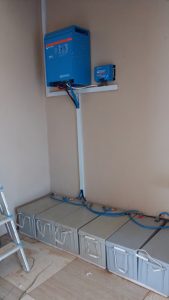Punjo is not Pona : Not All Solar Panels Are Equal
Nii koi’s wife was pregnant with their third child, and as usual her food cravings seemed to change by the hour. This morning she wanted Pona yams with smoked fish light soup. Being a great husband Nii Koi dashes to the nearby grocery down the road and ends up being sold Punjo yams ,a lower priced ,larger variety of yam. Most Ghanaians prefer the higher sugar content and finer texture in Pona yams even though they can be quite pricey especially when yams are not in season. Thinking he had found a great deal Nii Koi proceeded to complete his assignment.
His wife was very furious, I will not eat this yam
“All yam be yam he exclaimed” and she hissed back, Punjo is not Pona
To cut a long story short his wife refused to eat the Punjo yams and insisted that he get Pona yams to satisfy her cravings

Jinko Solar panels are durable and efficient
Selling Solar in a harsh economic climate like Ghana can be quite challenging ,it’s not unusual for prospective customers to ask questions such as “why your solar panels cost Ghc X when so and so in the market is selling it for so much less at Ghc. Y.”
The simple answer is – Not All Solar Panels Are Equal.
Punjo is not Puna : Not All Solar Panels Are Equal
So when you compare prices for solar panels (and we do encourage you to shop around), you do need to pay attention to 2 key aspects of the panel’s quality – GRADE and MANUFACTURER TIER.
Grade & Manufacturer Tier
 GRADE refers to the quality of solar cell used in the solar panel, and are categorized as A, B, C, or D. “Grade A” cells are the highest quality, in that they are tested to ensure there are no micro-cracks in the solar cell, and all the cells are of the same type. The quality diminishes for grade B, which may have micro cracks and not all cells are of the same type (they sometimes mix and match). Grades C and D are much worse quality with larger cracks and chips, and the cell mismatch is even worse since typical solar cell will be exposed to sunlight throughout its lifetime. Sunlight contains harmful ultraviolet (UV) light that deteriorates all materials, including solar cells. The tiny flaws in the material become worse after prolonged exposure to sunlight, and its power output reduces over time.As a grade A cell has the least flaws to start with, its deterioration will be the slowest.
GRADE refers to the quality of solar cell used in the solar panel, and are categorized as A, B, C, or D. “Grade A” cells are the highest quality, in that they are tested to ensure there are no micro-cracks in the solar cell, and all the cells are of the same type. The quality diminishes for grade B, which may have micro cracks and not all cells are of the same type (they sometimes mix and match). Grades C and D are much worse quality with larger cracks and chips, and the cell mismatch is even worse since typical solar cell will be exposed to sunlight throughout its lifetime. Sunlight contains harmful ultraviolet (UV) light that deteriorates all materials, including solar cells. The tiny flaws in the material become worse after prolonged exposure to sunlight, and its power output reduces over time.As a grade A cell has the least flaws to start with, its deterioration will be the slowest.
MANUFACTURER TIER refers to how automated a manufacturer is in its manufacturing process, its manufacturing volume, how long it has been in the industry, and how much it invests in R&D. There are 3 tiers to classify this:

certified engineers installing Jinko Panels in the heart of Ghana capital city,Accra
Tier 1 manufacturers are the top 2% of solar manufacturers, normally producing over 1 GW of solar panels in a year. They are vertically integrated meaning they make their own cells and wafers, invest heavily in R&D, and have advanced robotic processes for manufacturing,and have been manufacturing solar panels for longer than 5 years. Tier 2 manufacturers are small to medium scale manufacturers, with little or no investment in R&D. They only use partial robotics in their manufacturing process, and rely more on manual work from human production lines.
They have been producing panels for 2 to 5 years. Tier 3 manufacturers are actually just Assemblers – i.e. they assemble other manufacturer’s cells into a panel. This is 90% of the new solar PV companies, with no investment in R&D, and they use human production lines for manual soldering of solar cells instead of advanced robotics. They have been assembling solar panels for 1-2 years. You get best (and consistent) results from Grade A panels manufactured by a Tier 1 manufacturer.
They may cost a little more on a per-watt basis, but when you consider the energy output and the longevity of their panels, you actually get more energy out of Tier 1 / Grade A panels than anyone else. And ultimately, you have to ask yourself what matters to you more — the total number of watts of a solar panel, or the actual kWh (units) of energy produced by the panel?That’s why we at Nocheski Solar use Grade A solar panels from Tier 1 manufacturers like Jinko Solar and Victron Energy which ensures the best overall value in terms overall electricity output and long-term high quality.Hope this helps you when you compare solar panel prices.Let us know your feedback.All that being said, its prudent to watch out for unscrupulous industry players who may be selling counterfeited solar products but that is another whole discussion for another day.
Punjo is not Puna : Not All Solar Panels Are Equal












